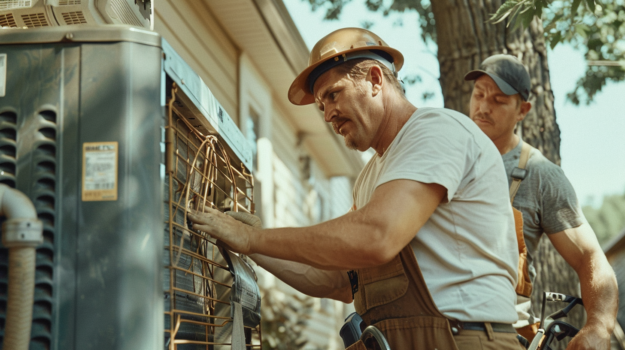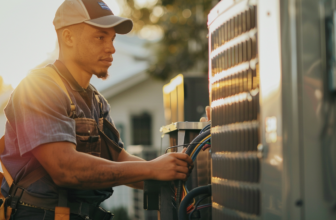As urban spaces continue to grow and evolve, more people are turning to indoor gardening and urban agriculture to cultivate their own food in small, controlled environments. Whether it’s for personal use or larger-scale urban farming initiatives, controlling the indoor environment is essential for successful plant growth. HVAC systems play a critical role in regulating temperature, humidity, and air quality, ensuring that plants thrive even in confined indoor spaces. Let’s explore how modern HVAC systems are supporting the growth of indoor gardens and urban agriculture.
Temperature Control: Creating the Ideal Environment for Plants
One of the most crucial factors for healthy plant growth is temperature control. Different plants require different temperature ranges, and keeping that range consistent is essential for maximizing yields. HVAC systems provide a reliable way to maintain these ideal conditions, ensuring that plants are neither too hot nor too cold. With advanced controls, you can adjust the temperature according to the specific needs of the plants you’re growing.
For example, integrating an adding AC to gas furnace into your indoor garden setup can help maintain consistent temperatures for plants that need a cooler environment. On the other hand, a high-performance 4 ton furnace can provide reliable heating during colder months to ensure that plants continue to thrive even when outdoor temperatures drop.
Humidity Control: Ensuring Optimal Growth Conditions
Maintaining the right level of humidity is essential for indoor plants. Too much humidity can lead to mold and mildew growth, while too little can cause plants to dry out. HVAC systems equipped with humidifiers and dehumidifiers can help maintain the optimal balance, ensuring that plants receive the moisture they need without creating a damp, unhealthy environment.
For indoor gardening in urban areas, this level of control is vital. An HVAC system that integrates both heating and cooling elements, such as a gas furnace, ensures that plants are growing in a stable, controlled environment. The right humidity levels not only help plants grow faster but also protect them from diseases caused by improper moisture conditions.
Air Quality and Ventilation for Healthier Plants
Air quality is another critical factor in indoor gardening and urban agriculture. Plants need fresh air to thrive, and a well-ventilated space ensures that they receive the right amount of carbon dioxide for photosynthesis. HVAC systems play a key role in circulating fresh air and removing pollutants or stale air, making sure that indoor plants get a continuous supply of clean air.
A properly ventilated HVAC setup can include air purifiers and filtration systems that remove harmful particles from the air. By integrating these features into a 100000 BTU furnace, you can create an environment where plants grow healthier and more robust. Clean, well-ventilated air improves the overall quality of your indoor garden, leading to better yields and a more sustainable growing process.
Tailoring HVAC Systems for Different Plants
Not all plants thrive in the same conditions, which means your HVAC system needs to be flexible enough to cater to a variety of growing needs. Some plants prefer cooler environments, while others need warmth and higher humidity. With modern HVAC systems, you can tailor different zones within your indoor garden to match the specific needs of each plant type.
For instance, a setup that includes a propane furnace for a mobile home can create a warm environment for plants that thrive in heat, while the air conditioning component keeps other zones cooler for plants that prefer lower temperatures. This zoning capability allows you to cultivate a diverse range of plants in the same space, each receiving the optimal conditions for growth.
Energy Efficiency and Sustainability in Indoor Gardening
Energy efficiency is a major consideration for indoor gardening, especially in urban agriculture where sustainability is often a core goal. Modern HVAC systems are designed to be energy-efficient, minimizing the environmental impact of maintaining controlled growing environments. By integrating energy-efficient furnaces and air conditioners, you can reduce the energy consumption of your indoor garden while maintaining optimal conditions for plant growth.
For example, using a gas furnace that is designed to operate efficiently reduces both the energy costs and carbon footprint of your indoor garden. Many urban farming initiatives prioritize sustainability, and by choosing the right HVAC system, you contribute to these goals by reducing your environmental impact while still creating a highly productive growing environment.
Automated Systems for Precision Control
Automation is becoming increasingly common in HVAC systems for indoor gardening. With smart thermostats and automated controls, you can set precise temperature and humidity levels for your garden, ensuring that conditions remain consistent even when you’re not there. This precision control helps avoid the risks associated with fluctuating environmental conditions, such as plant stress or disease.
For example, you can set up your 4 ton furnace to automatically adjust heating based on outdoor temperatures or integrate it with smart sensors that monitor the humidity levels in real-time. Automation ensures that your indoor garden operates efficiently, maintaining the perfect conditions for plant growth around the clock without requiring constant manual adjustments.
The Future of HVAC in Urban Agriculture
As urban agriculture continues to grow in popularity, HVAC systems will play an even more integral role in ensuring the success of indoor gardens. Future advancements in HVAC technology will likely include more energy-efficient systems, better integration with renewable energy sources, and even smarter automation features that allow for precision control over growing conditions.
With the right HVAC system, such as a 100000 BTU furnace or an energy-efficient gas furnace, you can optimize every aspect of your indoor garden, from temperature and humidity to air quality and ventilation. By embracing these technologies, urban farmers can create sustainable, productive growing environments that not only produce food but also contribute to a greener, more eco-friendly future for our cities.
Conclusion: HVAC Systems as Essential Tools for Indoor Gardening
Incorporating HVAC systems into indoor gardening and urban agriculture is essential for creating the ideal environment for plant growth. From temperature control to air quality and energy efficiency, these systems allow urban gardeners to maintain precise growing conditions, ensuring healthy plants and maximizing yields. By choosing the right HVAC system, such as a gas furnace or a propane furnace for a mobile home, you can take full control of your indoor gardening environment and ensure its success. As the world continues to urbanize, HVAC systems will remain at the forefront of urban agriculture, helping to sustain cities through efficient and innovative growing solutions.








